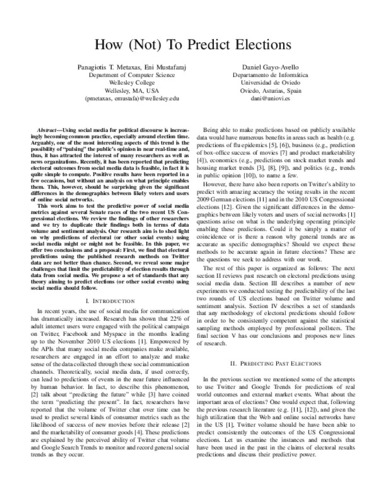How (not) to predict elections
Subject:
Elections
Prediction
Social Media Analysis
Publication date:
Editorial:
IEEE
Publisher version:
Descripción física:
Abstract:
Using social media for political discourse is increasingly becoming common practice, especially around election time. Arguably, one of the most interesting aspects of this trend is the possibility of ''pulsing'' the public's opinion in near real-time and, thus, it has attracted the interest of many researchers as well as news organizations. Recently, it has been reported that predicting electoral outcomes from social media data is feasible, in fact it is quite simple to compute. Positive results have been reported in a few occasions, but without an analysis on what principle enables them. This, however, should be surprising given the significant differences in the demographics between likely voters and users of online social networks. This work aims to test the predictive power of social media metrics against several Senate races of the two recent US Congressional elections. We review the findings of other researchers and we try to duplicate their findings both in terms of data volume and sentiment analysis. Our research aim is to shed light on why predictions of electoral (or other social events) using social media might or might not be feasible. In this paper, we offer two conclusions and a proposal: First, we find that electoral predictions using the published research methods on Twitter data are not better than chance. Second, we reveal some major challenges that limit the predictability of election results through data from social media. We propose a set of standards that any theory aiming to predict elections (or other social events) using social media should follow.
Using social media for political discourse is increasingly becoming common practice, especially around election time. Arguably, one of the most interesting aspects of this trend is the possibility of ''pulsing'' the public's opinion in near real-time and, thus, it has attracted the interest of many researchers as well as news organizations. Recently, it has been reported that predicting electoral outcomes from social media data is feasible, in fact it is quite simple to compute. Positive results have been reported in a few occasions, but without an analysis on what principle enables them. This, however, should be surprising given the significant differences in the demographics between likely voters and users of online social networks. This work aims to test the predictive power of social media metrics against several Senate races of the two recent US Congressional elections. We review the findings of other researchers and we try to duplicate their findings both in terms of data volume and sentiment analysis. Our research aim is to shed light on why predictions of electoral (or other social events) using social media might or might not be feasible. In this paper, we offer two conclusions and a proposal: First, we find that electoral predictions using the published research methods on Twitter data are not better than chance. Second, we reveal some major challenges that limit the predictability of election results through data from social media. We propose a set of standards that any theory aiming to predict elections (or other social events) using social media should follow.
Description:
2011 IEEE International Conference on Privacy, Security, Risk, and Trust, and IEEE International Conference on Social Computing, Boston
ISBN:
Collections
- Informática [875]
- Ponencias, Discursos y Conferencias [4231]
Files in this item





